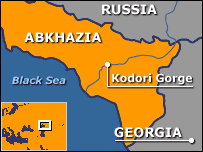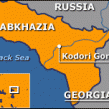
GEORGIA DEMONSTRATES POLITICAL, MILITARY SKILL IN KODORI GORGE
Publication: Eurasia Daily Monitor Volume: 3 Issue: 148
By:

Georgian authorities are beginning to restore normal conditions for daily life in the upper Kodori Gorge, following the successful law-and-order operation on July 25-27 that forced the Moscow-manipulated rebel chieftain Emzar Kvitsiani to flee the area. The upper Kodori Gorge is the only part of pre-1992 Abkhazia’s territory not controlled by the secessionist authorities.
Conducted jointly by Georgia’s Internal Affairs and Defense Ministries, the operation turned out to be remarkably clean, with only one civilian death, two policemen injured, and no known casualties among Kvitsiani’s followers, a small number of whom have apparently made their way into Abkhaz-controlled territory. Russian propaganda clearly failed in its attempt to build up Kvitsiani into a spokesman for the Svan ethnic group that inhabits the Kodori Gorge.
Most Defense Ministry personnel are already being withdrawn from the gorge in the wake of the successful operation. An Interior Ministry unit, reinforced by a small military element, is to be permanently stationed in Kodori in order to provide security for the population and prevent organized crime. Substantial arms caches have been found and continue to be discovered on a daily basis. According to intelligence data, Russian and Abkhaz special services had delivered weapons to Kvitsiani’s group in March, presumably in preparation for the rebellion he had launched on July 22 against the Georgian government. At least some of the weapons apparently originated from Russia’s base at Gudauta in Abkhazia, where the arms stockpile of the “Baghramian” Armenian battalion was ostensibly “robbed” and its rifles and grenade launchers sent up the gorge to Kvitsiani’s group.
Kvitsiani and his nephew Bacho Argvliani, who operated criminal rackets in the area, are being sought for investigation and trial. Russian television has twice interviewed Kvitsiani at an undisclosed location, presumably in Abkhazia. He used the interviews to urge Georgian soldiers and policemen to turn their arms against their commanders, ministers, and the Georgian president; and he continued urging “Mingrelians” to rise against the Georgian government — a line intermittently used in Russian psychological warfare operations against Georgia since the early 1990s and that always fell flat. Reverting, moreover, to one of Moscow’s themes familiar from the two anti-Chechen wars, Kvitsiani alleged in these interviews that “Arabs” and “Chechens” participated in the Georgian operation and that he also spotted a “Negro,” presumably proving American involvement (Russian TV Channel One “Vremya,” July 27; Imedi TV, July 30).
Georgian authorities are currently distributing flour, sugar, vegetable oil, and other staples to Kodori residents as well as 200 lari ($115) in cash per household. The authorities are bringing construction materials into the gorge for an urgent program to rebuild schools, roads, a medical clinic, and a disused airport, as well as restoring bus service to Kodori from the rest of Georgia.
The Tbilisi-backed legislative assembly and government of the pre-1992 Autonomous Republic of Abkhazia is now moving from Tbilisi to the Kodori Gorge. It shall be headquartered temporarily in the village of Azhara, pending the construction of an appropriate building. These pre-1992 bodies represent Abkhazia’s entire population, including its Georgian population, which had formed 45% of the total (to 17% Abkhaz) prior to the Russia-aided mass ethnic cleansing of Georgians. The relocation of these bodies from Tbilisi to the Kodori Gorge, within the pre-1992 Abkhazia’s territory, amounts to a strong political signal that Georgia intends to reverse the outcome of that war, albeit through a political process. Georgia will probably support the participation of these two representative bodies in some role in the negotiations toward a political resolution of the conflict.
In Sukhumi, delegations from Russia’s North Caucasus and southern Russian regions held talks with the secessionist leadership in recent days, promising to send “thousands of volunteers” to support Abkhazia in the event of hostilities with Georgia. They declare that they would in that case reach Abkhazia and Georgia itself not only or not necessarily through Sukhumi (which would expose the Russian political authorities’ complicity), but rather via Kabardino-Balkaria or Karachaevo-Cherkessia. In that case, however, the hand of Russia’s secret services would be exposed. Although Tbilisi is determined not to initiate any such hostilities, Russian military intelligence may well use its experience at provoking clashes so as to discredit Georgia.
In the aftermath of Georgia’s successful operation, President Mikheil Saakashvili told the nation that a retreat from Kodori or negotiations with Kvitsiani (as the latter’s handlers were seeking) “would have been the beginning of the end of Georgian statehood.” Thanks to the skillful operation, however, Kvitsiani seems set to join the “brigade of political corpses” in a Russian safe haven.
(Rustavi-2 TV, Mze TV, Kavkas-Press, Interfax, July 27-31)




